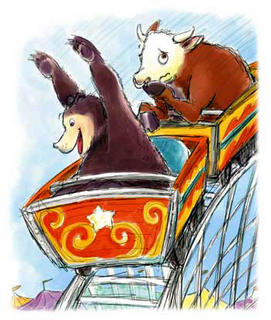
The perfect recipe for a stock bear market is forming: rising inflation, higher interest rates, record oil prices (tripled since 2002), record consumer and government debt, record trade deficits, a slowing economy, and converging long and short term interest rates.
Inflation is obviously occurring. Healthcare, housing, pharmaceuticals, groceries, etc. have all gone up.
Oil Prices are at record highs and since World War II, all major oil spikes but one have brought on a recession, observes Mark Zandi, chief economist at Economy.com. The reason: Each sustained $10 increase in oil prices shaves almost a percentage point off growth. Current forecasts of an increase of 4 percent or more in gross domestic product assume oil at $45. A higher price, Zandi believes, means slower growth, which could lead to lower stock prices.
Consumer debt levels have more than doubled in 5 years to over $11 trillion.
Government debt has increased at a growing rate every year of the Bush presidency. In the last 4 years $2.2 trillion dollars has been added to the national debt and this drags on the market. Deficits matter because the increased government borrowing creates a drag on the economy. It reduces the amount of capital available for private investment and consequently the increased national income that would result from greater investment. The deficits are not going to end any time soon either.
The trade deficit is not closing and it is currently ranging in approximately the $50 to 60 billion per month range. The widening of the trade deficit reflects slow growth in U.S. export markets. Money is leaving the US and going elsewhere and like a dyke that has sprung a leak, disaster is just a matter of time if something is not done.
The Conference Board, the firm which publishes the U.S. Leading Economic Indicators series, said its index has declined 1.9 percent in the year to May. This generally signals a sharp economic slowdown.
Long and short-term interest rates are converging which says the bond folks are anticipating deflation brought on by a bursting of the real estate bubble or a more serious economic slowdown.
Also, according to Economist.com:
"The housing market has played such a big role in propping up America's economy that a sharp slowdown in house prices is likely to have severe consequences. Over the past four years, consumer spending and residential construction have together accounted for 90% of the total growth in GDP. And over two-fifths of all private-sector jobs created since 2001 have been in housing-related sectors, such as construction, real estate and mortgage broking.
One of the best international studies of how house-price busts can hurt economies has been done by the International Monetary Fund. Analyzing house prices in 14 countries during 1970-2001, it identified 20 examples of busts, when real prices fell by almost 30% on average (the fall in nominal prices was smaller). All but one of those housing busts led to a recession, with GDP after three years falling to an average of 8% below its previous growth trend. America was the only country to avoid a boom and bust during that period. This time it looks likely to join the club."
Since December 2000 employment in U.S. manufacturing has fallen 17 percent, but membership in the National Association of Realtors has risen 58 percent. Housing is holding the economy up and we don't have manufacturing to fall back on anymore.
The housing bubble already appears to be busting with two declining months of housing starts in May and June. The bubble will burst and you can see the extreme negative effects it could have on the economy.
A recession and a market decline seem very likely in the coming months. My advice is be VERY careful and stay conservative in what you invest in. Don't get caught in a bear trap and always remember cash is king.
No comments:
Post a Comment